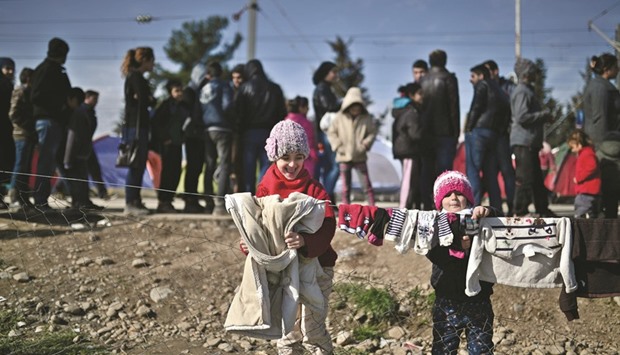The EU has proposed €700mn in emergency aid for Greece and other states as it began to tackle the migrant crisis within its borders like humanitarian disasters in developing countries.
The United Nations has warned of a looming humanitarian crisis as thousands of people remained stuck in miserable winter conditions on the Greece-Macedonia border after Balkans states and Austria capped the numbers arriving.
Greece has been the main point of entry for the 1.13mn migrants who have arrived since the start of 2015 in the European Union, which has been divided and weakened by its biggest migration crisis since World War II.
“No time can be lost in deploying all means possible to prevent humanitarian suffering within our own borders,” EU Humanitarian Aid Commissioner Christos Stylianides said as he announced the plan.
The funds would be allocated over three years, with €300mn ($325mn) in 2016, and €200mn in each of the following years under the plan, which must be approved by a majority of member states and the European Parliament.
“To a great extent, this assistance will go to Greece. This is where we have the most serious humanitarian crisis,” Stylianides told reporters in Brussels.
Athens has asked for around €480mn ($520mn) to help shelter 100,000 refugees.
The crisis is particularly acute at the Greek border crossing of Idomeni where more than 10,000 are stuck after Balkan states including neighbouring Macedonia imposed tighter controls.
Non-EU Macedonia allowed some 250 Syrian and Iraqi refugees to cross yesterday, the first group since dawn on Monday when the frontier was closed.
Those kept out had then tried to break through the border fence but were blocked by Macedonian police who fired tear gas at them.
Bleak scenes were playing out yesterday with refugees in mud-soaked fields fighting over food distributed from the back of a van, as aid agencies reported a lack of food and tents, and warned that the wintry weather was taking a toll on people’s health.
“We know (the border) is closed, but what will happen? There isn’t any other way. We must go here and wait,” said Mouiiaed Saker, a 37-year-old Syrian firefighter.
Meanwhile in the French port of Calais, demolition workers were razing makeshift shelters in the so-called Jungle migrant camp for the third day running under the close watch of dozens of police officers equipped with water cannon.
The camp is a magnet for people hoping to reach Britain and many have refused to leave, although there has been no repeat of the violent clashes that erupted on Monday.
So far, more than 131,000 migrants have crossed the Mediterranean to reach Europe this year, UN figures show – more than the total number for the first five months of 2015.
Last year, a million landed on Europe’s shores.
“Europe is on the cusp of a largely self-induced humanitarian crisis,” UN Refugee agency (UNHCR) spokesman Adrian Edwards said on Tuesday.
The European plan for an internal aid mechanism marks a departure for the 28-nation bloc, which normally only gives aid to countries outside the EU, notably in the Middle East and Africa.
The EU, which has an annual aid budget of €1.2bn for external countries, would work directly with the UN and other aid agencies in Europe, in another first.
But the apparent show of European solidarity masks growing criticism of countries that have capped the number of migrants they are willing to let in.
European leaders are divided ahead of two summits this month on the migration crisis, with German Chancellor Angela Merkel saying that debt-hit Greece must not be allowed to plunge into “chaos”.
The crisis has also raised fears for the EU’s Schengen passport-free zone as more states bring back border controls.
Yesterday EU President Donald Tusk defended the use of barbed-wire fences against migrants, saying that securing the Schengen area’s outer borders was a “pre-condition” to solving the refugee crisis.
“I’m afraid that sometimes you need tougher measures if you, we want really to apply Schengen. Sorry but this is the reality,” Tusk said in Slovenia as part of a multi-country tour ending in Turkey later this week.
The EU and Turkey are will hold a crucial summit in Brussels on March 7 to discuss a faltering deal they signed in November under which Ankara agreed to limit the flow of migrants.
Around 380 migrants who cannot be classified as refugees were being returned from Greece to Turkey, in what may be a sign of improved co-operation, the European Commission said.

Children hang laundry on a fence as other queue for food in the makeshift migrant camp at the Greek-Macedonian border, near the Greek village of Idomeni, yesterday.
